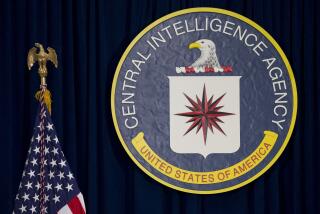LAW FIRM BACKS ABC IN SUIT BY CIA
ABC News has found an unlikely ally in its 4-month-old legal dispute with the Central Intelligence Agency.
A public-interest law firm that often has argued against ABC and the other TV networks has, again, told the Federal Communications Commission that it should bar government agencies from bringing fairness-doctrine complaints against broadcasters.
The FCC should not allow itself to become “an unconstitutional tool for the government to use in retaliation against broadcast journalists,” the Washington-based Media Access Project argued in a petition filed late Tuesday with the commission.
The firm’s comments to the FCC come as part of the latest round of legal filings in an unprecedented case first brought by the CIA last November.
Media Access Project is a longtime supporter of the controversial FCC fairness rule that requires broadcasters to air opposing points of view on controversial issues of public importance. During hearings in Washington two weeks ago, the law firm’s director, Andrew Jay Schwartzman, led the opposition to efforts by reigning FCC Chairman Mark Fowler to abolish the fairness regulation.
Fowler’s efforts have been supported by the networks and other commercial broadcasters. According to commission procedures, however, ABC has not formally addressed the CIA’s complaint.
Despite its support for the fairness doctrine, Media Access Project said that it did not accept the notion advanced by the CIA that agencies of the federal government have a right to bring fairness complaints to the FCC.
The CIA, the law firm argued, “has outrageously appropriated for its own use the fairness doctrine, which was intended to be afforded to the citizenry, not to the government.”
The intelligence agency has claimed that ABC violated the FCC fairness doctrine and personal-attack rules and engaged in deliberate news distortion in a two-part news report broadcast in September, 1984. ABC charged in the disputed reports that the agency conducted an array of illegal activities, including a plot to murder an American businessman, through a now-bankrupt Honolulu investment firm.
ABC later found it could not substantiate the murder charge. The network did not retract other allegations raised in its broadcasts, however, and the CIA took the matter to the FCC, the independent regulatory agency that oversees the networks and other holders of broadcast TV and radio licenses.
In January, the FCC staff dismissed the CIA’s complaint while claiming that, contrary to an argument advanced by Media Access Project and others, nothing in the FCC’s rules barred government agencies from bringing such actions against the networks.
Earlier this month, the intelligence agency filed an appeal of that staff ruling and asked the commission to require ABC to respond to the CIA’s complaint, conduct an appropriate investigation “and grant such further relief as the FCC may deem appropriate.”
The CIA’s complaint is the first fairness-doctrine case ever brought against a network by a federal agency.
And, according to the Media Access Project, the CIA’s complaint also should be the last that the FCC hears from another arm of the government. Allowing the CIA to carry on its fight with ABC, the law firm said, offends the basic idea of a free press protected from government interference by the First Amendment.
“The CIA is here invoking governmental process . . . to impose legal obligations on the press because of a news report the CIA believes to be incorrect and defamatory,” the law firm said in its 11-page petition.
“A broadcaster must be free of the fear that the government, with all of its power and unlimited resources, will haul it before even an impartial tribunal . . . to insist that it account for its criticism of government.
“If such a fear exists, broadcast journalists may well refrain from critical reporting of government agencies.”
A similar argument has been advanced by the American Civil Liberties Union, which has also filed comments in the CIA-ABC case. The ACLU asked the FCC to establish a clear policy that government agencies are prohibited from filing fairness or news-distortion complaints.
More to Read
The biggest entertainment stories
Get our big stories about Hollywood, film, television, music, arts, culture and more right in your inbox as soon as they publish.
You may occasionally receive promotional content from the Los Angeles Times.










